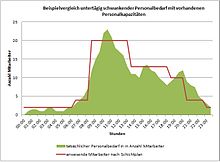Personnel logistics
Personnel logistics is a holistic approach to the sustainable and economical solution of covering working time requirements and working time supply.
aims
The personnel logistics approach was developed to significantly reduce the complexity of personnel deployment planning processes - especially in areas with strongly fluctuating (long-term, medium-term, intraday) personnel requirements.
The personnel logistics approach essentially consists of three recommendations for action:
- Defusing the planning problem through iterative approach to the optimal planning in the stages: strategic, tactical and operational planning
- Redundancy-free and integrated system worlds - no workflow breaks and double processing in planning-relevant processes and data.
- Meaningful key figures and actions to be taken for sustainable control of productivity
Individual disciplines of personnel logistics
The following individual disciplines can be found within personnel logistics:
- Determination of personnel requirements ( forecasting )
- Working time model design
- Time management
- Layer design and layer model design
- Workforce planning
- Staffing
- Personnel time recording
- Personnel time management
- Personnel logistic key figure systems
History of personnel logistics
The approach of personnel logistics was developed in the years after the turn of the millennium by the working time advisor Hans Romeiser. The basic idea was to see working time as a “logistical good” and to develop a method based on logistical approaches for the needs-based provision of working time . Today this approach is used in practice by many companies. Various management consultancies have also specialized in the subject.
See also
literature
- Horst-Werner Feldmann: Workforce Productivity: Holistic optimization strategies for human resources. Hirschenverlag, Fürth 2006, ISBN 3-939480-00-2 .
- http://www.fuehrungskraefte-forum.de/?page_id=109
- Frank Kieper: Dynamic success controlling as a solution approach for operational personnel cost management. Hampp Verlag, Munich and Mering, 1996, ISBN 3-87988-197-9
- August-Wilhelm Scheer: Business Informatics: Reference Models for Industrial Business Processes . 7th edition. Springer-Verlag, Berlin / Heidelberg 1997, ISBN 3-540-62967-X , p. 509 ( limited preview in Google Book search).
Web links
- Manfred Helmus, Anica Meins-Becker, Lars Laußat, Agnes Kelm (eds.): RFID in construction logistics: Research report on the project "Integrated value creation model with RFID in the construction and real estate industry" (= RFID in construction ). 1st edition. Springer-Verlag, Wiesbaden 2009, ISBN 978-3-8348-0765-6 , pp. 50 ( limited preview in Google Book search).

